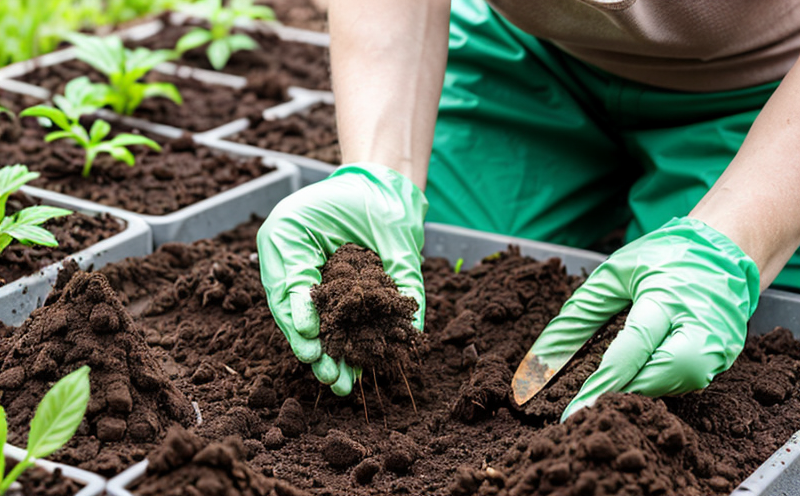JIS K 7218 Hardness Testing of Gardening Plastics
The JIS K 7218 hardness test is a standardized method used to determine the resistance of plastics, particularly those used in gardening and outdoor applications, to indentation. This test is crucial for ensuring that materials meet specific quality standards, which can affect the longevity and durability of products like garden furniture, planters, and irrigation systems. The test involves applying a defined load to a specified indenter on the surface of the sample until penetration reaches a predetermined depth.
The JIS K 7218 hardness scale is similar in concept to other hardness scales such as Shore or Rockwell but tailored for plastic materials. It provides a numerical value that indicates how hard the material is, which can be used to compare different plastics or versions of the same product over time.
When conducting this test, it's important to follow strict protocols outlined in the JIS K 7218 standard. These include selecting the appropriate indenter shape and size for the specific type of plastic being tested, ensuring the sample is prepared correctly, and applying the load at a consistent rate. The resulting hardness value can then be compared against industry standards or previous test results to ensure consistency in product quality.
The importance of this test cannot be overstated, especially in industries where outdoor exposure is common. Gardening plastics are often subjected to environmental factors that can degrade their physical properties over time. By using the JIS K 7218 hardness test, manufacturers and suppliers can verify that their products will withstand these conditions without losing structural integrity.
Furthermore, compliance with this standard ensures that products meet regulatory requirements and industry expectations, enhancing brand reputation and customer trust. This is particularly important in the gardening sector where product performance directly impacts user satisfaction.
In summary, JIS K 7218 hardness testing is an essential tool for quality assurance in the production of outdoor plastics used in gardening applications. It provides a reliable measure of material toughness that can help guide design decisions and improve overall product reliability.
- Ensures compliance with international standards
- Maintains consistent product quality
- Enhances user satisfaction by ensuring durability
- Meets regulatory requirements for outdoor products
- Guides material selection in R&D processes
Scope and Methodology
The scope of the JIS K 7218 hardness test includes a variety of rigid plastic materials commonly used in gardening applications. These include polyethylene (PE), polypropylene (PP), polystyrene (PS), and acrylonitrile butadiene styrene (ABS). The test is particularly useful for evaluating the hardness of molded parts, extruded profiles, and other formed articles.
The methodology involves selecting a suitable indenter based on the type of plastic being tested. For instance, a steel ball or diamond cone may be used depending on the material properties. The sample must then be prepared by cutting it to the appropriate dimensions, typically 10 mm in diameter for small samples. The test is conducted at room temperature with a specified load applied over a fixed time period.
The resulting hardness value is determined by measuring the depth of indentation and converting this into a numerical scale. This value represents the material's resistance to deformation under a given force, providing valuable insights into its suitability for outdoor use.
Why Choose This Test
- Ensures Quality Compliance: By adhering to JIS K 7218 standards, manufacturers can ensure that their products meet international quality benchmarks.
- Promotes Durability: The test helps in identifying materials with adequate hardness for outdoor applications, reducing the risk of premature failure due to environmental stressors.
- Improves Product Reliability: Consistent results from this test can enhance confidence in product performance over time and across different environments.
- Saves Development Time: Understanding material properties early in the design process allows for more informed decisions about material selection and processing techniques.
- Risk Mitigation: Identifying weak points in materials through this test can help avoid costly recalls and legal issues associated with product failures.
- Enhances Brand Reputation: Compliance with recognized standards like JIS K 7218 can significantly boost a company's reputation among consumers who value quality and reliability.
- Fosters Innovation: The test provides insights that can drive improvements in materials science, leading to the development of more advanced garden plastics.
Customer Impact and Satisfaction
The JIS K 7218 hardness test plays a vital role in enhancing customer satisfaction by ensuring that gardening products are robust enough to withstand outdoor conditions. This is particularly important for items like garden furniture, which must endure exposure to sunlight, rain, and temperature fluctuations.
By conducting this test, manufacturers can identify optimal materials that offer the right balance of hardness and flexibility. This not only extends the life of the product but also ensures it remains functional even under harsh weather conditions. As a result, customers receive products they can trust, which contributes to higher levels of customer satisfaction.
Moreover, compliance with international standards like JIS K 7218 helps build trust between manufacturers and their customers. This is especially beneficial in the gardening sector where long-term product performance is crucial for both consumer peace of mind and brand loyalty.





